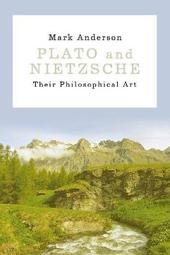
|
Plato and Nietzsche: Their Philosophical Art
Paperback / softback
Main Details
Description
It is commonly known that Nietzsche is one of Plato's primary philosophical antagonists, yet there is no full-length treatment in English of their ideas in dialogue and debate. Plato and Nietzsche is an advanced introduction to these two thinkers, with original insights and arguments interspersed throughout the text. Through a rigorous exploration of their ideas on art, metaphysics, ethics, and the nature of philosophy, and by explaining and analyzing each man's distinctive approach, Mark Anderson demonstrates the many and varied ways they play off against one another. This book provides the background necessary to understanding the principle matters at issue between these two philosophers and to developing an awareness that Nietzsche's engagement with Plato is deeper and more nuanced than it is often presented as being.
Author Biography
Mark Anderson is Associate Professor and Chair of the Department of Philosophy and Director of Classics at Belmont University, Nashville, Tennessee, USA. He is the author of Pure: Modernity, Philosophy, and the One (2009) and translator of selections from Plato's "myths" in Gods, Heroes, and Monsters: A Sourcebook of Greek, Roman, and Near Eastern Myths in Translation, edited by Carolina Lopez-Ruiz (2013).
ReviewsThis is a comprehensive, elegant, and meticulous study of Nietzsche's attempt to challenge and supersede Plato's profound legacy. Mark Anderson's ambitious goal, which is both personal and scholarly, is to explore the creative artistry that binds these two thinkers together in an eternal and unresolved struggle. I think he succeeds to a remarkable degree. * Paul Loeb, Professor of Philosophy, University of Puget Sound, USA. * According to Nietzsche, a philosophical system can be "refuted and dead, but the person behind it is irrefutable, the person aways remains immortal - for instance, Plato." Mark Anderson's study of how Nietzsche reacts and responds to the irrefutable Plato can be recommended to philosophers, classicsts, and intellectual historians alike. It will be welcomed by anyone interested in the filiation of ideas who is prepared to think afresh about the real aims of Nietzsche's project. * Paul Bishop, William Jacks Chair in Modern Languages, University of Glasgow, UK * This excellent and intriguing book should be recommended not only to anyone interested in Plato and Nietzsche, but also to anyone interested in philosophy. * The Classical Review * Written with knowledge, wit, skill and profound love for philosophy as a way of life, this beautiful introduction to the intellectual adventures of Plato and Nietzsche is also an authentic philosophical achievement on its own right. * Niketas Siniossoglou, author of "Radical Platonism in Byzantium: Illumination and Utopia in Gemistos Plethon" * Nietzsche saw Plato as his chief philosophical rival, but the relationship between their thought proved to be far more complicated than one of simple opposition. This is the first book devoted to this complex relationship. With scholarly rigor, lively writing, and equal appreciation of each philosopher, Anderson cuts a new path for those interested in either. * Patrick Lee Miller, Assistant Professor of Philosophy, Duquesne University, USA * Writing incisively and with disarming modesty and sincerity, Anderson engages the reader in imaginary, inward conversations with Plato, Nietzsche and himself. As befits the peripatetic tradition of philosophy, one is transported now to ancient Athens, now to nineteenth century Alpine Sils-Maria. * Dr. Eva Cybulska, Independent Scholar * In this work of philosophical acumen and literary sensitivity, Mark Anderson enters the ring with Plato and Nietzsche, not to adjudicate their contest, but to wrestle with them over the question of what it is to be a philosopher who lives in the truth. * William F. Vallicella, Retired Professor of Philosophy, Case Western Reserve University, USA. * This is a deftly written and well-researched exploration of the relationship between two of the most important figures in Western philosophy, Plato and Nietzsche. It makes a substantive contribution to the ongoing conversation about Nietzsche's relationship to the ancient world that is likely to inspire interest in and further research on the subject. Anderson should be applauded for his efforts. * Matthew Meyer, Assistant Professor, Department of Philosophy, The University of Scranton, USA *
|